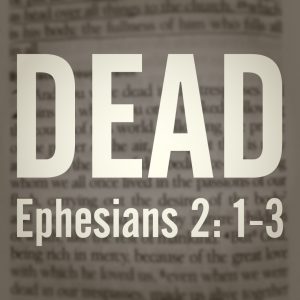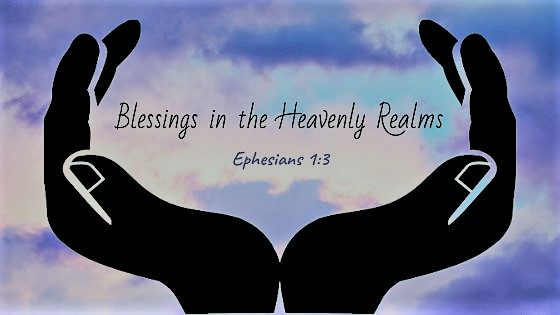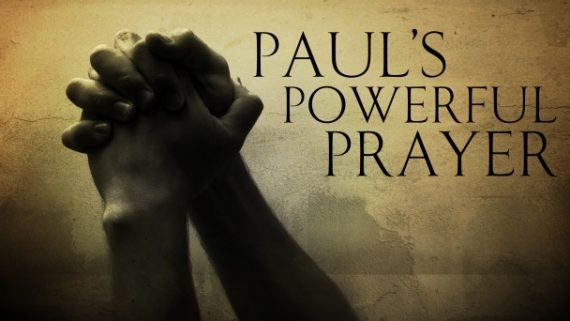Do you understand what is going on in the world? You would, if you understand the real problem with humanity. Ephesians 2:2 begins to show us what this problem is. The verse contains three phrases that point to one single reality as the identity of our problem. Before we get to our study of Ephesians 2:2, however, we will be answering a question from a reader about hell and ultimate reconciliation.

Ultimate Reconciliation?
Do you think the ultimate restoration of all things (not the same thing as universalism though people could get nervous and think so) is possible?
I address this question in my book, (#AmazonAdLink) What is Hell?, but let me briefly summarize what I write in the book.
First, let me state the 3 basic views on what happens to unregenerate people after they die.
The first view is Eternal Conscious torment. This it the view that unregenerate people go to a place of suffering where they spend eternity in pain and agony.
The second view is Universalism, which is the view that there is no hell of any kind, and all people go to spend eternity with God after they die.
The third main view is Annihilationism. This is the view that there is no afterlife at all for unregenerate people. When unregenerate people die, they simply cease to exist.
(#AmazonAdLink)  Now, there are shades and variations on all these views. For example, some people believe that unregenerate people will go to a place of suffering and torment, but they won’t spend eternity there. Instead, they will eventually be annihilated. So this view is sort of a cross between Eternal Conscious torment and Annihilationism.
Now, there are shades and variations on all these views. For example, some people believe that unregenerate people will go to a place of suffering and torment, but they won’t spend eternity there. Instead, they will eventually be annihilated. So this view is sort of a cross between Eternal Conscious torment and Annihilationism.
There is another view that is a cross between Eternal Conscious torment and Universalism. This view is often rereferred to as Ultimate Reconciliation. In it, unregenerate people who die will begin eternity separated from God in some form, but over time, they will see that they were wrong, and will repent and believe in Jesus and so will eventually and ultimately be reconciled to God. Over millions and billions of years (if such a term even applies to eternity), hell will be slowly emptied as more and more people are reconciled to God.
It is this last view that the reader is asking about. She wants to know if Ultimate Reconciliation is possible. In (#AmazonAdLink) my book on hell, I state that while I think it is possible, I do not think it is likely. This is not because God doesn’t allow it, but because human and stubborn and rebellious creatures. I believe that God will hold out the option for anyone who begins eternity separated from Him to be reconciled to Him if they so desire, I believe that while many may accept this gracious offer, there will be many other people who will eternally refuse the offer.
I would love to be wrong on this. I hope I am wrong.
But here’s the thing with humans. We make our decisions, and then our decisions make us. The longer a person remains in rebellion against God, the more likely they are to remain in that rebellion. This applies, I believe, not just for this life, but for eternity as well.
So do I believe in ultimate reconciliation? I do believe that God will extend such an offer to all of unredeemed humanity, but I do not believe that all of humanity will respond positively to that offer, so no, I do not think that ultimate reconciliation will ever occur.
By the way, this doesn’t mean that I believe that these unregenerate people will spend eternity suffering in the flames of hell. I don’t believe that the afterlife for the unregenerate will be a place of torment and torture at all. They will be in a place where they are allowed to be who they want to be, which for the unredeemed, will be an eternity of selfish, loveless, graceless, merciless living. As Scripture describes it, such an existence will be an eternal death. It will be sort of like this present life, but amplified in all the negative ways.
To learn more about what the Bible really teaches about hell, check out my book, (#AmazonAdLink) What is Hell?
Ephesians 2:2 is a text that sort of speaks to this issue. It is the verse we are looking at today in this Podcast study. It doesn’t talk about what happens to unregenerate people after they die, but is instead describing what happens to unregenerate people while they live on this earth. I believe that the way people live now is a bit of a foreshadowing of how they will exist in eternity as well. So let us look at Ephesians 2:2.
We were Subjects to Satan (Ephesians 2:2)
In our study of Ephesians 2:1, we summarized the entire message of Ephesians 2, and saw that it was divided into three sections. The problem (Ephesians 2:1-3), the Solution (Ephesians 2:4-10), and the Application (Ephesians 2:11-22). By reverse engineering the chapter, we discover that in Ephesians 2:1-3, Paul is describing the real problem with humanity, and this problem is far different and far worse than anything we thought or imagined or than what we hear in most of our churches and Christian books.
Ephesians 2:1 began to talk about this problem by saying that we were dead in trespasses and sins. This meant that we did not function the way God intended humans to function, but were instead dominated by sin, which is primarily defined in the Bible as violence against other human beings.
Ephesians 2:2 continues this train of thought. Paul writes:
Ephesians 2:2. … in which you used to live when you followed the ways of this world and of the ruler of the kingdom of the air, the spirit who is now at work in those who are disobedient.
 Paul says here that we used to live in transgressions and sins. The actual term here is peripateo – to walk about. So rather than “used to live” we should read it “used to walk.”
Paul says here that we used to live in transgressions and sins. The actual term here is peripateo – to walk about. So rather than “used to live” we should read it “used to walk.”
Our former way of life was a death walk. We were on a walk – but not the kind of walk most of us go on during the warm summer evenings. This walk – in the words of John Stott – “was no pleasant promenade in the countryside.” It was a death walk; a walk of slavery to trespasses and sins. We were walking the plank, and didn’t even know it. We were walking the road to destruction, and didn’t know anything different.
In a way, we were a bit like lemmings. Lemmings blindly follow the crowd until they fall off a cliff or drown in the ocean. Like them, we were headed for destruction and didn’t even know it. It was who we were and what we did.
 In the rest of Ephesians 2:2, Paul uses three phrases to describe the way we used to walk. But all three terms point to the same reality. Let’s discuss the three terms and then I will identify the single reality that Paul has in view.
In the rest of Ephesians 2:2, Paul uses three phrases to describe the way we used to walk. But all three terms point to the same reality. Let’s discuss the three terms and then I will identify the single reality that Paul has in view.
The ways of this world
So the first is the ways of this world. This terms refers to how the world operates. It is a reference to the world domination system. How people seek to dominate, rule, and control other people through violence and threats of violence. It consists of the rules, both spoken and unspoken, which guide how all entities of this world work, including governments, militaries, institutions, and business.
As Hoehner writes “This world is the satanically organized system that hates and opposes all that is godly (John 15:18, 23)” (Hoehner, BKC, 622).
I will eventually have an entry on “world” in my Gospel Dictionary online course.
Followed the Ruler of the Kingdom of the Air
So we followed the ways of this world, and second, we followed the ruler of the kingdom of the air. Who is this ruler or prince? We saw this ruler mentioned in Ephesians 1:21 when Paul mentioned that Christ is above all rule, authority, power, dominion and title. In that list of five spiritual beings, the term rule (or ruler) comes first.
 So the kingdom of the air can be none other than the demonic realm, which means that the ruler must be Satan (cf. 1 John 5:19; 2 Cor 4:4; Rev 12:9). We will discuss satan more in a bit.
So the kingdom of the air can be none other than the demonic realm, which means that the ruler must be Satan (cf. 1 John 5:19; 2 Cor 4:4; Rev 12:9). We will discuss satan more in a bit.
What about this kingdom of the air? The kingdom of the air refers to the invisible and unseen forces that guide our thoughts and movements in this world. Since it is of the “air,” this means this kingdom surrounds us all the time, even though we don’t see it, can’t hear it, and don’t even know it is there.
I know … this is sounding a bit like Morpheus trying to describe The Matrix to Neo. But the analogy is actually a very good one. The kingdom of the air is like the Matrix. It enslaves us in ways that we cannot break free from on our own, and so that we don’t even know we are enslaved. It is around us all the time like the very air we breathe. We live by it, operate by it, and are governed by it, even though we don’t know it exists.
I will talk more about this kingdom next time when we look at Ephesians 2:3.
The spirit at work in the disobedient
The third thing we followed which resulted in transgression and sin is the spirit who is now at work in those who are disobedient. This is the impersonal and immaterial force or nature or characterization that is present within this world which leads us into disobedience.
This spirit of disobedience is set in contrast to the spirit of wisdom and revelation in Ephesians 1:17. The spirit of wisdom and revelation guides us into the way God wants us to live, while the spirit at work in the disobedient guides people to live in ways that are contrary to God.
So we have three terms that Paul uses here.
But what is the single reality these terms point to?
Could it be … SATAN?
It’s not really a joking matter, but it is indeed Satan that Paul is describing here.
The Saturday Night Live sketch with the Church Lady was funny though, because many Christians do indeed see Satan around every corner and under every rock and bush, but the sad reality, is that far too few Christians really understand what Satan is and how Satan works.
Ironically, when most Christians blame the problems of the world on Satan, they are actually behaving in a satanic way. To see Satan under every rock and bush is to behave satanically.
Shocking statement, I know. Let me unpack it.
The word “satan” comes from the Hebrew term ha satan. It means, “the accuser.” The spirit of accusation. I will eventually have an entry on the word satan in my Gospel Dictionary online course. It’s not there yet.
 The word does not refer to a being or entity that dresses in red and has a pointy tale and horns on his head. It also does not refer to an evil being who goes around trying to tempt people to sin. Oh yes, the spirit of satan brings temptation, but not exactly in the way we think.
The word does not refer to a being or entity that dresses in red and has a pointy tale and horns on his head. It also does not refer to an evil being who goes around trying to tempt people to sin. Oh yes, the spirit of satan brings temptation, but not exactly in the way we think.
The word satan is the single word which Paul has in view here. The three phrases in Ephesians 2:2 describe satan. “Satan” refers to the course of this world … the way the world runs. It refers to the ruler of the kingdom of the air, which means that this way of ruling the world is around us all the time like the very air we breathe. It is the spirit at work in the disobedient. The spirit of the accuser leads people to be disobedient, to do the things that God does not want us to do.
So satan is spirit of this age, the spirit of accusation and blame. We all think everyone else is guilty and we ourselves are innocent. The spirit that leads us to condemn others in God’s name and to call for violence and bloodshed against others in God’s name.
And sadly, religious people are guilty of living by the spirit of this age just as much – if not more – than non-religious people. Religious people are adept at using our Scriptures and our rules to condemn and accuse others and to call for “holy war” against our enemies. We view our enemies as the enemies of God, and so we use our religious zeal for God to call for the death of our enemies.
This the same concern Jesus had. This is why Jesus instructed us to love our enemies. Paul is concerned here with the same thing that Jesus was most concerned with, which is the religious sins which people commit in God’s name. Rather than hate and accuse our enemies, we need to turn away from the spirit of accusation and turn instead to the Holy Spirit of love and acceptance. Paul is not just pointing out how unbelievers live, but how we believers live as well.
This is why, when Paul uses the term “disobedient” there at the end of Ephesians 2:2, he didn’t use some other term like “unbelievers” or “unregernate.” Why not? Because followers of Jesus can be disobedient also. We too can fall prey to the ruler of the kingdom of the air, the spirit of accusation that dominates this world. And we often do.
When we Christians engage in accusation and condemnation, when we call for the death of enemies, when we encourage violence in the name of God, it is then that we are not following the Holy Spirit, but rather the spirit of this age, the satanic spirit of blame and accusation. It is then that Christians are in fact satanic.
Strong words. I know.
But are you seeing why Paul’s description of the problem in Ephesians 2:1-3 is so important to properly understand? This is not just a description of what “they” do, but is also a description of what we do. Yes, Paul says that this is the way in which we used to walk, but sadly, far too many Christians (myself included) still walk in the old ways. So Paul is going to eventually show what Jesus did to call us to a different way of living, and then also show us how we can do that practically in our world today.
But before we can get to the solution and the application, there is one more verse to go in the description of our problem. This is found in Ephesians 2:3, which we will consider next time.




 I recently received this question from Aaron:
I recently received this question from Aaron: First, truth. Peace does not require truth about our enemies, but truth about ourselves. Finger pointing always leads to war. But it is only we can look at our own face in the mirror that we can own up to our own violence and bring an end to it.
First, truth. Peace does not require truth about our enemies, but truth about ourselves. Finger pointing always leads to war. But it is only we can look at our own face in the mirror that we can own up to our own violence and bring an end to it.
 In my online course and my book, I teach that the word “dead” refers to something that is not functioning properly.
In my online course and my book, I teach that the word “dead” refers to something that is not functioning properly.
 Be careful about accusing and condemning others. If you are into politics, it is very easy to start seeing your political opponents as monsters. As less than human. It is easy to start calling them names and wishing for their death. That is the sin Paul has in view here in Ephesians 2:1.
Be careful about accusing and condemning others. If you are into politics, it is very easy to start seeing your political opponents as monsters. As less than human. It is easy to start calling them names and wishing for their death. That is the sin Paul has in view here in Ephesians 2:1.


 So here, when the Bible says (cf. also Ephesians 6:10) that God is powerful, powerful, powerful, we know that He is completely powerful. It also is one of His primary characteristics. In theological terms, we say that God is omnipotent – all powerful.
So here, when the Bible says (cf. also Ephesians 6:10) that God is powerful, powerful, powerful, we know that He is completely powerful. It also is one of His primary characteristics. In theological terms, we say that God is omnipotent – all powerful.

 It is the church.
It is the church.

 First,
First, 






 A raft of logs would be floated from the Black Sea and when they got to Ephesus or Corinth, the different lumber merchants would come and look over the logs and make their selections of which ones they wanted. One would say, “I will take these,” and another, “I’ll buy those over there.”
A raft of logs would be floated from the Black Sea and when they got to Ephesus or Corinth, the different lumber merchants would come and look over the logs and make their selections of which ones they wanted. One would say, “I will take these,” and another, “I’ll buy those over there.”
 Just as you can know that you have eternal life because Jesus does not lie to us, we can know we have been sealed because God does not lie to us. If you have believed in Jesus for eternal life, then you have been sealed by the Holy Spirit. You can take it by faith because it is a promise of God and God does not lie. The indwelling Holy Spirit is a deposit in your life that God has given to you in advance of your final glorification, redemption, and new resurrected body in eternity.
Just as you can know that you have eternal life because Jesus does not lie to us, we can know we have been sealed because God does not lie to us. If you have believed in Jesus for eternal life, then you have been sealed by the Holy Spirit. You can take it by faith because it is a promise of God and God does not lie. The indwelling Holy Spirit is a deposit in your life that God has given to you in advance of your final glorification, redemption, and new resurrected body in eternity.